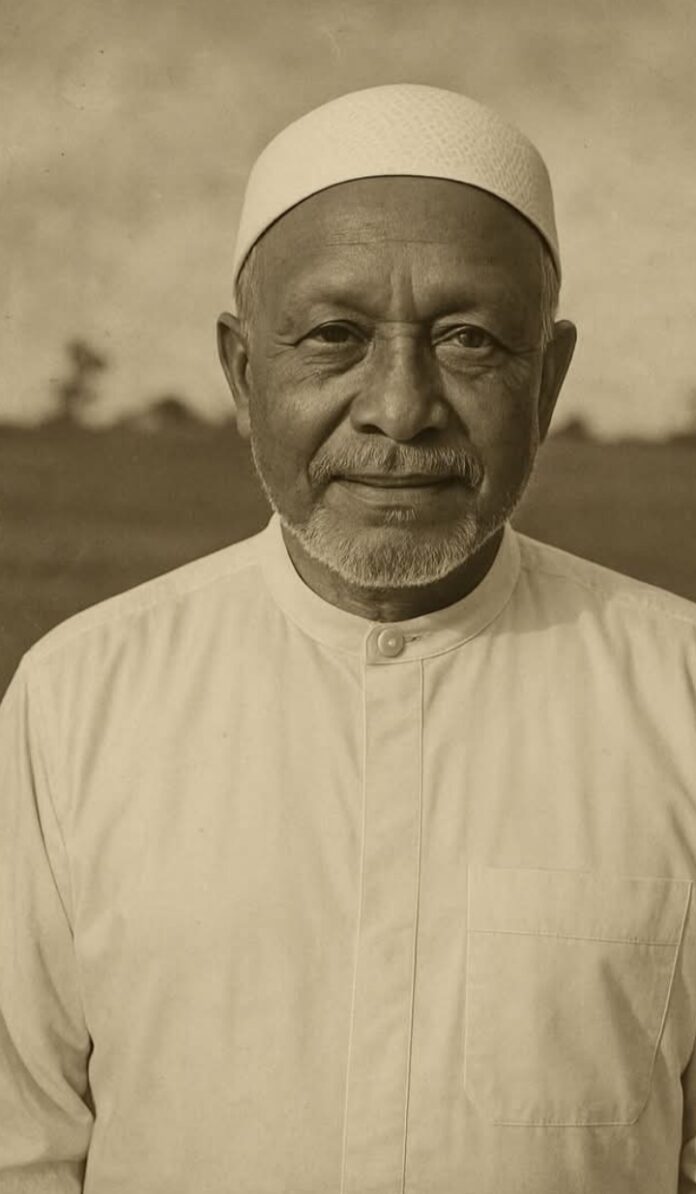It is rare to come across a Tiv Muslim. In a land where nerly 95% of the Tiv people cling to Christianity, and the remaining 5% either practice ancient traditions or reject organized faith altogether, the choice of a Tiv man to embrace Islam is almost unheard of. Yet, in the heart of Taraba State, such a man exists—and his story is as unconventional as it is profound.
While gathering evidence for *The Battle of Karagbe: The Forbidden History*, I found myself returning to my birthplace, Madaini, in Gassol Local Government Area. The land was restless, torn apart by whispers of hatred and shouts of vengeance. The air itself felt heavy—thick with the smell of dust, smoke, and fear. It was during these dangerous days that I sought refuge in the home of Alhaji Ernan Haruna Ayem Fela, a man whose very identity straddled the great religious divide.
As a Tiv man who had crossed from Christianity into Islam, Alhaji Haruna and his family moved like untouchable shadows between worlds. They carried an immunity that seemed almost supernatural—shielded from the wild storms of violence that raged between Christians and Muslims. While others were hunted for their faith, he stood untouched.
One afternoon, as the chaos tightened its grip on Taraba, I sat in a Fulani settlement, sipping *nono*, the sour milk tang lingering on my tongue, when my phone buzzed. It was Munkaila, the Alhaji’s son. His voice was sharp with urgency: a church in the Tiv-Christian heart of Madaini had been set ablaze.
The motorcycle roared beneath me as I sped towards the scene, my mind racing faster than the engine. The flames had already eaten their fill, leaving only smoldering bones of wood and ash. But the scene was more tangled than it appeared. In the aftermath, a Fulani man lay dead. Whispers spread like dry-season fire—some claimed his death had sparked the attack, others said it was vengeance. But no one could name the man. No one had seen him before. No one knew where he had come from, or where he was going.
It was as though he had been dropped into the heart of Madaini solely to die.
Despite every resource at my disposal, the truth eluded me. Questions multiplied, each more unsettling than the last. Who had set the fire? Who had killed the man? And who were these shadowy figures that came to avenge a stranger’s death?
I knew I had to speak to the Alhaji himself. When I finally sat before him, the room carried the stillness of an unspoken truth. His eyes, deep and knowing, held the weight of someone who had walked both sides of faith.
“I didn’t convert from Christianity to Islam because they are different,” he began, his voice low but steady. “I did so when I found out they are the same—speaking of the same truth. Christianity and Islam came from the same source. The Old Testament of the Bible is what we call the Quran. The Roman Catholic Church has practices just like the mosque.”
His words struck me like a cold wind. I had been raised to believe the two faiths were bitter enemies, polar opposites. Many Christians and Muslims lived and died holding the same belief.
When I asked him about the so-called religious wars tearing through the Middle Belt, he leaned forward, his voice sharpening.
“There are no religious wars. There are only men who manipulate both religions for their gain. They will do anything to keep innocent followers in the dark, so they can exploit them forever.”
In that moment, the picture became painfully clear. This was not a battle of scripture, but of power. The ones fanning the flames were not true Christians or Muslims—they were predators cloaked in robes of faith. Religion, to them, was not sacred. It was a weapon.
And the killers? They were not martyrs or defenders of belief. They were mercenaries, terrorists, hired hands who cared nothing for God—only for blood, chaos, and control. They played the faithful like pieces on a chessboard, making neighbors into enemies, and enemies into corpses.
I left his home with the weight of a revelation pressing on my chest. The fire in Madaini had not been lit by faith. It had been lit by human greed, stoked by men who knew how to twist the heart of a people until it bled.
Perhaps that is the greatest tragedy—not that people kill for religion, but that they kill for men who do not believe in anything at all.
Editor’s Note:
By an anonymous writer who directed reader to further read “The Battle Of Karagbe: The Forbidden History” for the full story.
This piece does not reflect the views of the editorial and management team of this newspaper .



